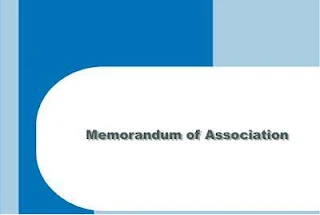 Memorandum Of Association :-
Memorandum Of Association :-It is the most important document because it defines the constitution of the company. Its sets out of the fundamental condition of incorporation and the objects for which the company was formed. It is the nature of contract between the company and the outside world.
It is the character of the company , the purpose of which is to enable all concerned poisons in the business. This document must be subscribed by at least seven persons in case of public company and two in case of private company. Each subscriber must take at least one share and must write against his name the number of shares he holds. The Memorandum must be:-
( a ) Prepared very carefully.
( b ) Printed.
( c ) Divided into different paragraphs.
( d ) Numbered consecutively.
( e ) Stamped according to the provision of Companies ordinance.
( f ) Signed by each subscriber in the presence of one witness.
Contents of Memorandum of Association
It contains the following particular or clauses.
1. Name of the company.
2. Domicile of the registered office.
3. Objects of the company.
4. Statement of limited liability.
5. Authorized capital.
6. Association or subscription clause.
1. Name of the company:-
( a ) Every public company has to use the word limited or "LTD" after its name and "private limited" as the last word in case of private company.
( b ) The name must not be identical with that of another registered company. the words "Empress" "Royal" "King" " Federal" must not be used without prior sanction of the government.
2. Domicile of the registrar office:-
Every company must have registered office to which all communication may be addressed it is advisable to mention the name of province or state to avoid the legal formalities in shifting its registered office.
3. Objects of the company:-
This clause set out the purpose for which the company is formed. It is the most important clause of the document which cannot be amended easily. The object provides the protection to the share holders, debenture holders, creditors or bankers and all other persons who want to deal with the company.
4. Statement of limited liability:-
According to this clause the liability of the members is limited to unpaid value of their share . Suppose a person purchases 10 shares of Rs. 100 each upon which he has paid calls for Rs. 80 per share, his liability to limited to unpaid value of Rs. 20 per share held. If he has paid the full nominal value of the shares, his liability is at an end.
5. Authorized capital:-
It is also called "Nominal" or "Registered" capital with which the company intends to be registered . This capital is divided into different shares of fixed amount. The stamp duty is payable on this sum.
6. Association or subscription clause:-
This clause must be subscribed by at least seven persons in case of public company and by at last two persons in case of private company.Each must hold at least one share and must sign the Memorandum before a witness.








0 Comments